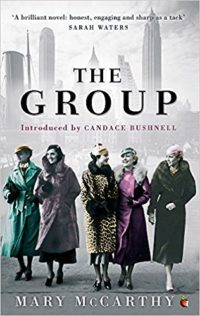Hypocrisy was the sole explanation she could find
 The Group
The Group
by Mary McCarthy
This is often mentioned as a feminist classic alongside the likes of The Awakening and Herland, so it should have been right up my street. The thing is, the other word thrown around about this book is “satirical”, which I have no problem with in theory, but in practice I have often taken a dislike to satirical books (for every Scoop there’s also an Emma). Humour is a tricky thing.
This is the story of a group of eight women, friends who graduate from Vassar College in 1933, and follows the next few years of their lives. Each chapter centres around a different member of “the group”, some with more crossover between the friends than others. It opens at the wedding of Kay and Harald one week after graduation. Kay is the first of the group to get married, though not the only one to have a fiancé before finishing college. The others are fascinated by her low-rent, friends-not-family wedding and its indication of her bohemian life to come (Harald is a playwright).
“To Elinor, this wedding was torture. Everything was so jaggedly ill-at-ease…Intelligent and morbidly sensitive, she was inwardly screaming with pity for the principals and vicarious mortification. Hypocrisy was the sole explanation she could find for the antiphonal bird twitter of ‘Terribly nice’ and ‘Isn’t this exciting?’ that had risen to greet the couple in lieu of a wedding march. Elinor was always firmly convinced of other people’s hypocrisy since she could not believe that they noticed less than she did.”
They are relatively wealthy women, but this is right in the middle of the Depression so there are various levels of scrimping and saving. Most of the women work, some have careers, they all think of themselves as modern.
But the most modern aspect of the novel is relative to the time when it was written: its frankness about sex, birth control and having children. One scene in particular stood out for me: a character goes to her gynaecologist to have a “ring” diaphragm fitted. The fitting and the doctor’s instructions are described in detail, to the point where it felt like McCarthy was taking the opportunity to educate her readers.
“Polly grasped it, because she was ‘a child of the depression’, but her father still felt that prosperity was just around the corner. That was why, to him, the ‘economies’ he made were a kind of play – an adventure, like when the power failed in the country and you used candles and oil lamps and drew your water from the well. Her father, in financial matters, always expected the power to come on again. This was a delusion, but a delusion shared by many people.”
I have no problem with that at all, but I feel that covering issues in this novel sometimes happens at the expense of psychological depth. I struggled to relate to these women because they only came alive for me at brief moments. Perhaps too many characters are juggled (as well as the eight women of the group, there are a couple of other women and a few men from whose perspective short sections are written). A lot happens in these 400-odd pages, though a lot of the big events are mentioned in passing, after the fact.
“Kay believed in Harald completely; she had no doubt he was bound to be famous, sooner or later, in whatever field he chose. But believing in him was different from believing him. In fact, the more impressed she was by him intellectually…the more she noticed his little lapses. And why was it that, with all his talent, he was still a stage manager when other people of his own age, people not nearly as bright as he was, had forged ahead of him? Was there something wrong with him that was evident to producers and directors and not to her?”
This isn’t to say I hated, or even disliked, this book. The writing is good, with some excellent sections. But I found it a little slow and stilted; dare I say cold?
First published 1963 by the New American Library.
Source: Christmas present from my sister.
Challenges: This counts towards the Classics Club.